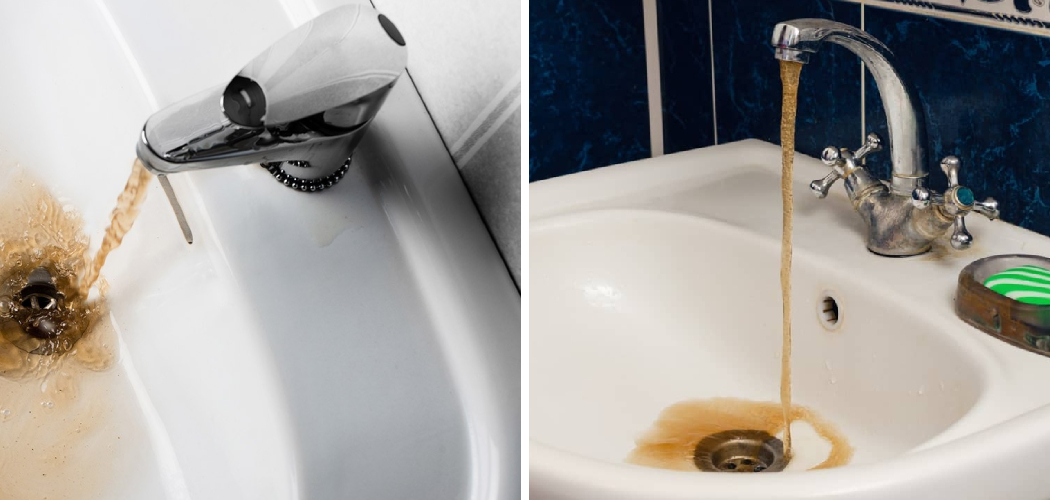Discovering black water coming out of your faucet can be alarming and raises immediate concerns about the safety and quality of your household water supply.
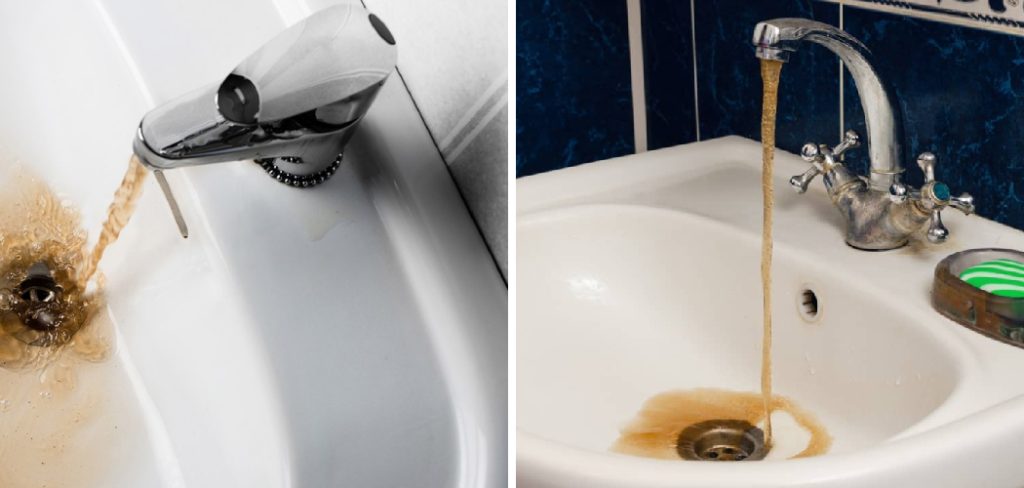
This guide on how to fix black water coming out of faucet aims to help you understand the common causes of black water, the potential health implications, and the necessary steps to diagnose and resolve the issue.
Whether it’s due to pipe corrosion, sediment build-up, or issues with your water source, knowing how to address the problem promptly and effectively is crucial for maintaining a safe and clean water supply in your home.
What is Black Water and What Causes It?
Black water is defined as any discolored water that appears dark or black in color. This can be caused by a variety of factors, including:
Pipe Corrosion:
Over time, pipes made from iron or steel may deteriorate due to exposure to minerals and chemicals in the water supply. As these pipes corrode, they can release sediment and other particles into the water, causing it to turn black.
Sediment Build-Up:
In areas with hard water, mineral deposits can accumulate inside pipes and faucets. These deposits can break off and mix with the flowing water, leading to black water coming out of the faucet.
Water Source Issues:
If your home’s water supply comes from a well, you may experience black water due to changes in the groundwater. For example, heavy rain or flooding can cause sediment and debris to enter the well, which can then flow into your home’s plumbing system.
Health Implications of Black Water
While it is natural to be concerned about the safety of black water coming out of your faucet, it is important to note that not all instances are necessarily harmful. In some cases, the discoloration may be caused by harmless minerals or particles.
However, black water can also indicate the presence of harmful bacteria or chemicals, which can pose a health risk if ingested. It is best to err on the side of caution and address the issue promptly.
8 Steps on How to Fix Black Water Coming Out of Faucet
If you notice black water coming out of your faucet, here are the steps you can take to diagnose and fix the problem:
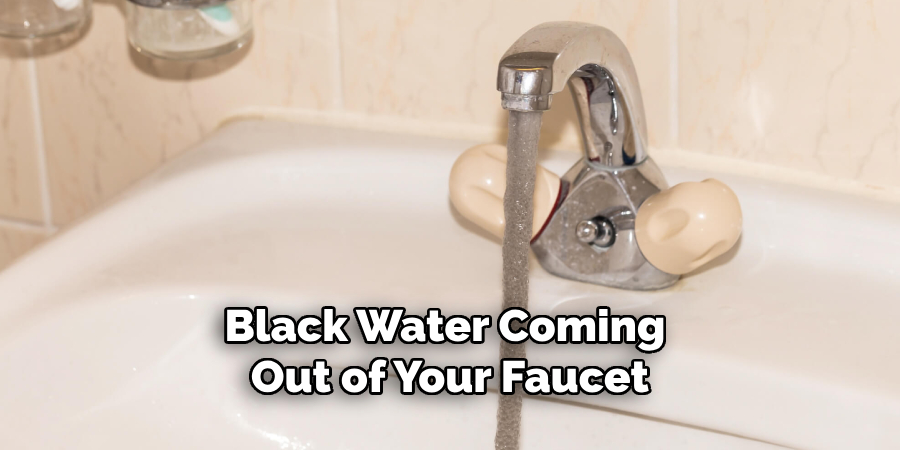
Step 1: Check Other Faucets
The first step in diagnosing the issue of black water is to determine whether it is isolated to a single faucet or affecting multiple faucets throughout your home. Turn on the water at different faucets in your house, including the bathroom, kitchen, and any outdoor spigots. Take note of which faucets are producing black water and which are not.
This information is crucial, as it can help pinpoint the source of the problem. If only one faucet has black water, the issue may be related to that specific fixture or a localized section of plumbing. However, if multiple faucets are affected, it indicates a more widespread issue, potentially involving the main water supply or the plumbing system as a whole.
Step 2: Flush the Lines
After determining which faucets are affected, the next step is to flush the lines. This process helps to clear out any sediment, rust, or other debris that may have accumulated in your plumbing system. To do this, turn on the affected faucets and let the water run for several minutes. Start with the faucet closest to your water main and work your way to the furthest faucet.
During the flushing process, observe the water flow and color. As the water runs, you should notice the black discoloration gradually diminishing, eventually returning to clear water. If the water remains discolored after several minutes, it indicates that more extensive cleaning or professional intervention may be needed.
Step 3: Check the Water Filter
If your home is equipped with a water filter, it’s important to check whether it could be the source of the black water. Water filters are designed to remove impurities from the water, but they can become clogged or damaged over time, potentially leading to discolored water.
Begin by locating your water filter, which may be installed under the sink, in the basement, or near the main water line. Follow the manufacturer’s instructions to safely remove and inspect the filter.
Look for signs of black sediment or debris that could be causing the discoloration. If the filter appears dirty or clogged, replace it with a new one. Filters should typically be replaced every 3 to 6 months, but this can vary based on usage and water quality.
Step 4: Inspect the Main Water Line
If flushing the lines and checking the water filter did not resolve the issue, it’s time to inspect the main water line. If your home has a well, check for any signs of damage or blockages in the well pump or pipes leading from the well to your house.
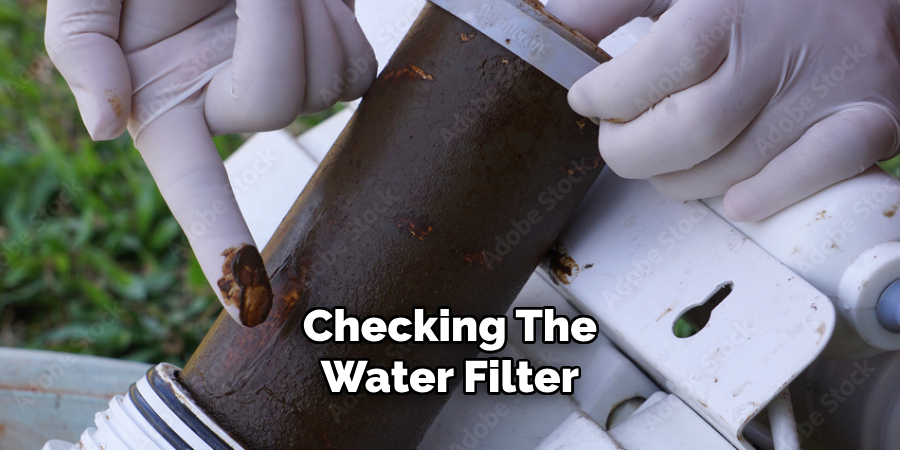
For homes on a municipal water supply, contact your local water department to report the issue and request an inspection of their infrastructure. It may be that the black water is due to a problem with the main water line or treatment plant, which requires professional attention.
Step 5: Test Your Water Quality
If you are still unable to determine the source of the black water, consider testing your household water for impurities.
You can purchase a home test kit from a hardware store or contact a professional water testing company. These tests can identify any contaminants in your water, allowing you to take appropriate measures to address the issue.
You may also want to contact your local health department for guidance on what tests are recommended in your area. They can provide valuable information about common water quality issues and potential solutions.
Step 6: Call a Professional Plumber
If the issue persists despite following these steps, it’s best to call a professional plumber for assistance. They will have the knowledge and equipment needed to thoroughly diagnose and repair any underlying plumbing issues causing black water.
They can also provide recommendations for ongoing maintenance to prevent future occurrences.
But before hiring a plumber, be sure to do your research and choose a reputable and experienced professional. You can ask for referrals from friends or family or read online reviews to find a trusted plumber in your area.
Step 7: Take Preventative Measures
After addressing the immediate issue of black water, it’s important to take preventative measures to avoid future occurrences. This includes regularly changing water filters, flushing the lines periodically, and keeping an eye out for any signs of leaks or damage in your plumbing system.

If you have hard water, consider installing a whole-house water softener to reduce mineral build-up. In areas with known issues of water contamination, investing in a quality filtration system can provide peace of mind and protect your family’s health.
Step 8: Be Vigilant
Even after resolving the issue of black water, it’s important to remain vigilant and observe the color and quality of your household water. If you notice any changes or recurring discoloration, take action immediately to prevent potential health risks.
Regular maintenance and inspections can help keep your plumbing system running smoothly and ensure clean, safe drinking water for you and your family.
By following these steps on how to fix black water coming out of faucet, you can effectively address the issue of black water coming out of your faucets and prevent it from happening again in the future.
Remember to always prioritize safety and if necessary, seek professional help for a thorough and lasting solution. Your home’s plumbing system is a vital part of your daily life, so taking good care of it is essential for maintaining a comfortable and healthy living environment.
Additional Tips
- If you have a water softener system, make sure it is properly maintained and functioning. A malfunctioning softener can lead to mineral build-up in your plumbing system, causing discoloration.
- If you live in an older home, consider having your pipes inspected by a professional plumber to check for any potential issues or damage.
- Regularly clean and disinfect your faucets and showerheads to prevent bacteria growth, which could contribute to discolored water.
- In addition to checking the main water line, the outdoor spigots should also be inspected for any signs of black water. If they are affected as well, it could indicate a problem with your main water supply.
- If you are experiencing other plumbing issues in addition to black water, it’s best to address them all at once with the help of a professional plumber. This can save time and money in the long run.
- Consider installing a whole-house water filtration system if you frequently experience issues with your household water quality. It can provide an extra layer of protection against contaminants and ensure clean, safe drinking water for your family. Overall, staying proactive and informed about your home’s plumbing system is key to maintaining a healthy and comfortable living environment. By following these tips and taking appropriate actions when needed, you can easily tackle the issue of black water and ensure clean and safe drinking water for your household. So don’t delay; take action today to address any potential issues with your household water supply!
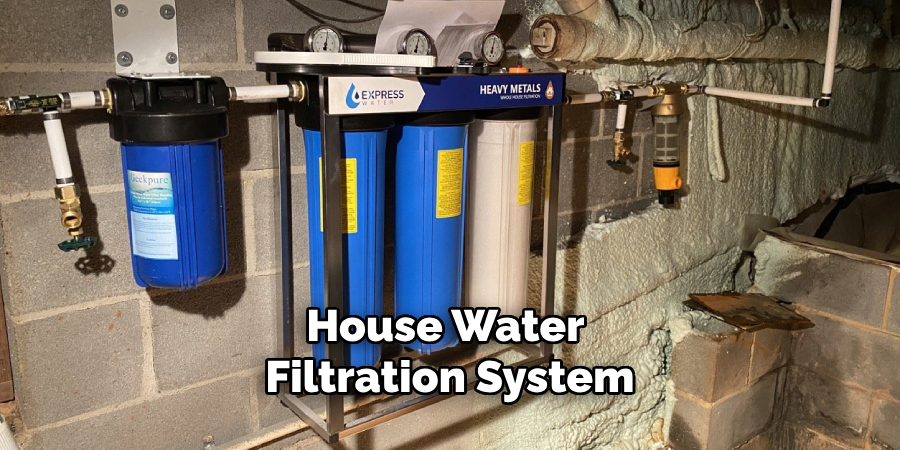
Frequently Asked Questions
Q: Is Black Water Safe to Drink?
A: No, it is not safe to drink or use for cooking. It may contain harmful contaminants and bacteria that can cause health problems. There may also be underlying issues with your plumbing system that need to be addressed. It’s best to avoid using black water and seek professional help for a thorough solution.
Q: How Often Should I Test My Household Water Quality?
A: It is recommended to test your household water quality at least once a year, or more frequently if you notice any changes in color, taste or smell. This can help identify potential issues early on and ensure the safety of your drinking water.
Q: Can Black Water Be Prevented?
A: Yes, by regularly maintaining your plumbing system and staying vigilant for any signs of damage or contamination. It’s also important to address any underlying issues immediately and take preventative measures, such as installing a filtration system or water softener. If the issue persists, it may be necessary to seek professional help for a thorough diagnosis and solution.

Q: Are Home Water Test Kits Accurate?
A: While home water test kits can provide an initial indication of potential impurities in your household water, they are not always accurate. For more precise results, it is recommended to contact a professional water testing company for a thorough analysis. Your local health department can also provide guidance on recommended tests in your area.
Conclusion
Addressing the issue of black water in your household is crucial for maintaining a safe and healthy living environment.
By following the steps outlined in this guide on how to fix black water coming out of faucet, from identifying the cause to taking preventative measures, you can efficiently resolve the issue and ensure your water supply remains clean and safe.
Regular maintenance, vigilance, and professional assistance when necessary are key to preventing future occurrences.
Remember, staying proactive and informed about your home’s plumbing system can save you time, effort, and potential health risks. Don’t wait for problems to arise—take action today to safeguard your family’s well-being.

